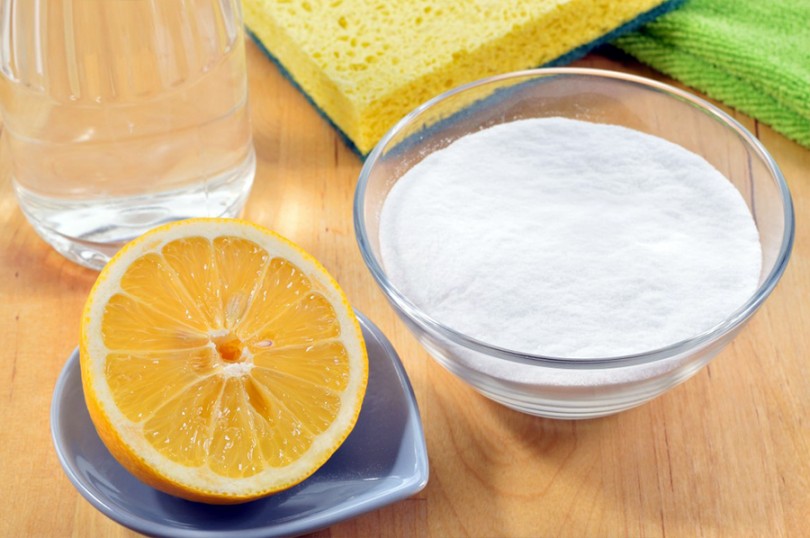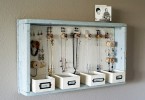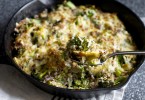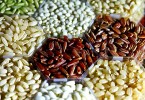Besides being good for you and the environment, green cleaning is inexpensive and makes shopping a lot easier. You can start right away with a few household ingredients that you probably already have in your cupboards. Buy them in bulk the next time you’re out to save time and money. You’ll have room for them as you ditch the half-dozen chemical cleaners you’ve likely used in the past.
Cleaning cloths
It’s okay to keep paper towels around but get in the habit of using repurposed clothing and towels for everyday cleaning.
- Put a box in your pantry or cupboard where you can store your cleaning cloths away from the good linens.
- Cotton shirts and sheets make excellent window cleaners since they are low in lint.
- Old flannel is good for polishing glassware, stainless steel and faucets.
- It’s a good idea to invest in a few dish cloths as they have more texture, which will help with scrubbing sinks and cookware.
- When wash cloths are ready to retire from the bathroom to the rag bin, draw a big X on them with a permanent marker so they don’t accidentally show up in the wrong place.
White vinegar
Buy it in one- or two-gallon bottles at grocery and discount stores.
- For the garbage disposal, distribute one cup of white vinegar evenly into the cells of an ice cube tray and top off with water. Place the frozen cubes in the garbage disposal to grind away greasy build-up and smelly residues.
- For dishes and glassware, pour one cup of vinegar into the bottom of your dishwasher once a month to prevent soap from building up on the inner workings and leaving a residue on your dishes.
- Vinegar is a terrific way to tackle mineral build-up wherever it occurs. Remove your shower head and soak it in a pan of full-strength white vinegar. While you’re at it, unscrew the rings that hold the aerators on your kitchen and bathroom faucets and drop them into the pan. In the morning, minerals will be gone. If the build-up is thick, you may need to rub the softened minerals off with a cloth and soak for another few hours.
- Mop your floors with solution of a half a cup of vinegar to one gallon of water to achieve a streak-free shine.
- A little full-strength vinegar is a great way to degrease and shine up salt and pepper shakers, olive oil bottles, figurines or just about anything glass or porcelain that hangs around making your kitchen homey.
- Place a quarter cup of vinegar in a 16-ounce spray bottle and fill it with water. Spray onto a soft cloth to buff greasy fingerprints from stainless steel and enamel appliances, faucets, countertops and the like.
Baking soda
Baking soda takes the place of harsh scrubbing compounds all over the house. Not only is it environmentally friendly, but it’s actually good for your skin rather than drying it out like some cleansers can.
- To clean sinks, wet a cleaning cloth and dampen the sink with water. Sprinkle liberally with baking soda, scrub and watch the shiny surface emerge. Baking soda is much easier on surfaces than harsh abrasives.
- For tea cups, tea pots and coffee mugs, place baking soda in a shallow dish and add just enough water to make a paste. Apply the paste to stained chinaware with a damp cloth, scrubbing gently and rinsing often to gauge your progress. To clean a stained tea pot spout, cut a thin strip from a clean rag, dampen it, cover it with baking powder and pull it through the spout repeatedly until clean.
- Waxes and oils are often applied to fruits and vegetables to help preserve them as they crisscross the country from growing regions to groceries.While this is effective, it may also seal in pesticides. Sprinkle a little baking soda on your tomatoes, apples, etc. and give them a very light scrub with your fingers or a cloth before you enjoy your produce. If you’re not eating them right away, pat them dry with a clean cloth.
- We’ve probably all heard that setting a box of baking soda in the refrigerator or freezer will eliminate odors, but the deodorizing power of baking soda can be used all over the house. Sprinkle baking soda in athletic shoes to freshen them overnight and simply tap out the excess over the sink or tub before wearing or transporting them.
Salt
It’s best to use uniodized salt around the house. Regular cooking salt is just fine. No need to splurge on kosher or sea salt for cleaning purposes.
- Toss a handful of non-iodized salt onto logs before starting a fire in your fireplace. It will produce a cheery bright yellow flame while helping to loosen soot from inside the chimney.
- To clean copper pans, put some salt in a saucer or small bowl and some vinegar in another. It takes a little effort, but the brightening effect is so amazing that you might actually enjoy it.
- A dry salt scrub is a great way to clean your cured cast iron without damaging the patina you’ve so carefully cultivated.
Lemon juice
You don’t have to have a lemon tree in the backyard to make this work. Fresh lemons are terrific, but bottled lemon juice works just as well.
- After washing with soap and water, brighten up worn wood and bamboo cutting boards and chopping blocks by rubbing them thoroughly with lemon juice. Lemon is a natural disinfectant and stain remover, and you’ll also remove any oily residues as you clean.
- Tackle grease stains on clothing by applying lemon juice to the spot. Allow it to sit overnight before washing as usual.
- To clean your microwave, add a quarter cup of lemon juice or the juice of one lemon to two cups of water in a microwave proof container, preferably one with a handle. Place the container in the microwave and heat on high for 8-10 minutes, or until a layer of condensation has formed on the inside of the oven. This steam treatment, along with the degreasing qualities of the lemon juice, will loosen food particles and allow you to wipe out the interior with a soft cloth or sponge.
- To shine up pots and pans, cut a lemon in half, sprinkle with salt, and use to clean copper, brass and stainless steel pans.
- Use a spray bottle filled with a solution of one-third lemon juice and two-thirds water with a lint-free cloth or crumpled newspapers to give windows and mirrors a streak-free shine while freshening the air. White vinegar also works well, but lemon juice smells better.
- If you do use fresh lemons or limes, toss the skins into the garbage disposal for a quick deodorizing and cleaning grind.







